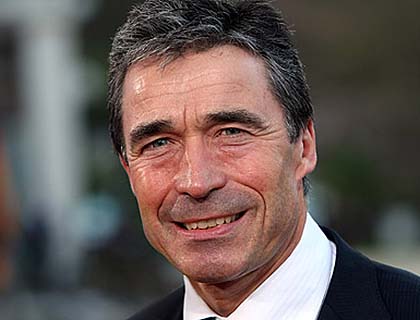KABUL – The NATO coalition will be forced to make a decision on its continued role in Afghanistan without a Bilateral Security Agreement (BSA) in place if the Afghan presidential election does not meet a conclusion soon, NATO Secretary-General Andres Fog Rasmussen warned on Monday.
The senior NATO official indicated continued military support, including a post-withdraw troop presence for training and advising purposes, as well as broader financial aid to Afghanistan, would likely be impossible if the BSA is not signed by a new Afghan president before the NATO summit begins on September 4.
"Soon we will have to take tough decisions, because if there is not a legal basis for our continued presence in Afghanistan, we will have to withdraw everything by the end of this year and to do that we will have to start planning ... very soon," Rasmussen told Reuters on Monday.
Foreign troops are scheduled to end their combat mission in Afghanistan by the end of the current year, at which point they will handover full security responsibilities to the Afghan National Security Forces (ANSF). While Afghan and foreign security officials have said that most security operations around the country have already been transitioned to the Afghan forces, experts have stressed that they will still require assistance form the international community in the coming years.
Concerns about the potential of a full withdraw of the United States and its NATO allies in December, which, among other things, would likely leave the Afghan government unable to meet the current costs of salaries for Afghan police and army personnel, first became an issue when President Hamid Karzai's refused to sign the BSA at the end of last year. His refusal was in contradiction to the recommendation made by a Loya Jirga that he himself convened and received condemnation from the Afghan Parliament and military elite.
Karzai’s uncompromising stance on the BSA is why the NATO coalition has now turned to this year’s presidential race as the only option left for getting the agreement signed. Both candidates, Abdullah Abdullah and Ashraf Ghani Ahmadzai, have made public promises to sign the deal upon their inauguration.
There are currently about 50,000 foreign troops in Afghanistan. Although U.S. and NATO officials have tossed around numbers of troops they would like to see stay in Afghanistan post-2014 to train and advise the Afghan forces, as well as conduct counterterrorism operations, they have made it clear such matters are contingent on when and how the BSA is finalized.
The U.S. Ambassador to Afghanistan, James Cunningham, also said on Monday that completing the presidential election, and subsequently the security agreement, before the NATO leaders summit in early September was crucial.
“It will be an important opportunity to Afghanistan to have a president who can sign our security agreement and provide clarity about what the future of our security partnership will be in the future and then go to the NATO summit in whales,” Ambassador Cunningham said.
Afghan political analysts have suggested that given Karzai’s growing tensions with his Western backers having him participate in the NATO summit instead of Abdullah or Ashraf Ghani could be problematic.
“Although President Karzai’s participation from a legal perspective is no problem, in terms of politics, there are tensions in relations between President Karzai and his western allies, particularly the U.S., and his participation would not please NATO leaders,” said Nasrullah Estanikzai, an Afghan legal and political analysts.
Meanwhile, both presidential campaigns have expressed the desire to see the election come to end soon, in part because the Afghan public has grown tired of the drown out process, but also for the purposes of the NATO summit.
Abdullah’s camp stressed that the individual who does attend the summit needs to have legitimacy in the eyes of the foreign participants. “The one who will be going to represent Afghanistan at the important NATO summit should have credibility in order to gain the satisfaction of the international community,” Abdullah camp spokesman Syed Fazel Aqa Sancharaki said.
On the basis of their recent power-sharing agreement, which was largely brokered by U.S. diplomats, Ashraf Ghani’s camp has maintained that both candidates would be in attendance at the summit so long as the election came ends before. “It has been decided that after the inauguration ceremony, the new president and the chief executive will represent Afghanistan in the summit,” said Faizullah Zaki, a member of Ghani’s campaign team. (Tolo News)

